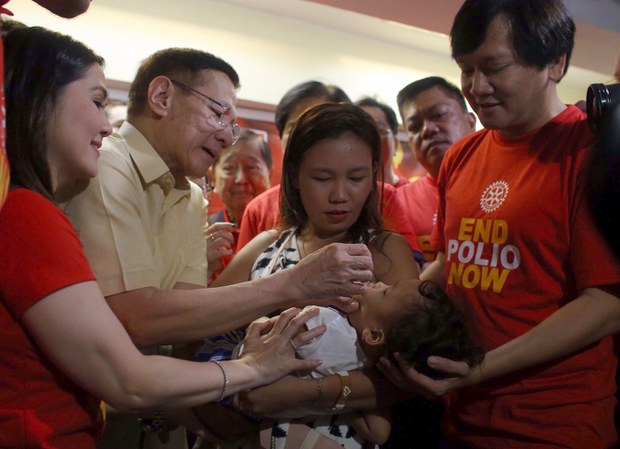Philippines Confirms Second Polio Case
2019.09.20
Manila
 Health Secretary Francisco Duque III gives a dose of the oral polio vaccine to a baby during the launch in Manila of an intensified campaign against the disease, Sept. 20, 2019.
Health Secretary Francisco Duque III gives a dose of the oral polio vaccine to a baby during the launch in Manila of an intensified campaign against the disease, Sept. 20, 2019.
Updated at 12:57 p.m. ET on 2019-09-20
The Philippine government on Friday confirmed a second case of polio, a day after authorities said the disease had reemerged after the nation was declared free of it 19 years ago.
A 5-year-old boy from Laguna province, near Manila, was found to have contracted polio, the Philippine Department of Health said as it launched an intensified campaign Friday to inform the public about the urgency of immunizing small children against the disease. The department plans to launch a nationwide polio vaccination drive next month.
Samples from the boy that were sent to the National Institute of Infectious Diseases in Japan had tested positive for the polio virus, officials said.
“The latest confirmed case was reported to be from an immunocompromised child who is suffering from multiple pediatric diseases,” the department said in a statement.
This is the second human case of polio – short for poliomyelitis – recorded in the Philippines this year. There is no known cure for the disease, which can cause nerve injury and paralysis, experts say.
The first confirmed case in 2019 was a 3-year-old girl from Lanao del Sur, a province in the south.
The department said the boy, who has been discharged from a hospital, experienced the onset of paralysis on Aug. 25. He has been able to walk, although he is being closely monitored, Philippine health officials said.
“We continue to urge parents and caregivers of children below five years old, health workers, and local chief executives to take part in the synchronized polio vaccination to be scheduled in their communities,” said Health Secretary Francisco Duque III.
Symptoms of polio include fever, fatigue, headache, vomiting, stiff neck and the sudden onset of weakening of the arms and legs. A severe case of infections among children aged five and younger can lead to paralysis or even death in rare cases, the World Health Organization (WHO) said.
An oral polio vaccine was introduced in 1988, and millions of people around the world have averted death or infections because of it. The vaccine contains a weakened form of the virus and activates a body’s protective response to polio.
The last known case of wild poliovirus recorded in the Philippines was in 1993, according to WHO, a U.N. agency that declared the Southeast Asian nation polio-free in 2000.
On Thursday, Duque announced that polio had reemerged in the Philippines, saying the virus had been detected in three regions.
Sewage in the capital Manila and waterways in the southern Davao region were also confirmed to contain the virus, the health secretary said.







